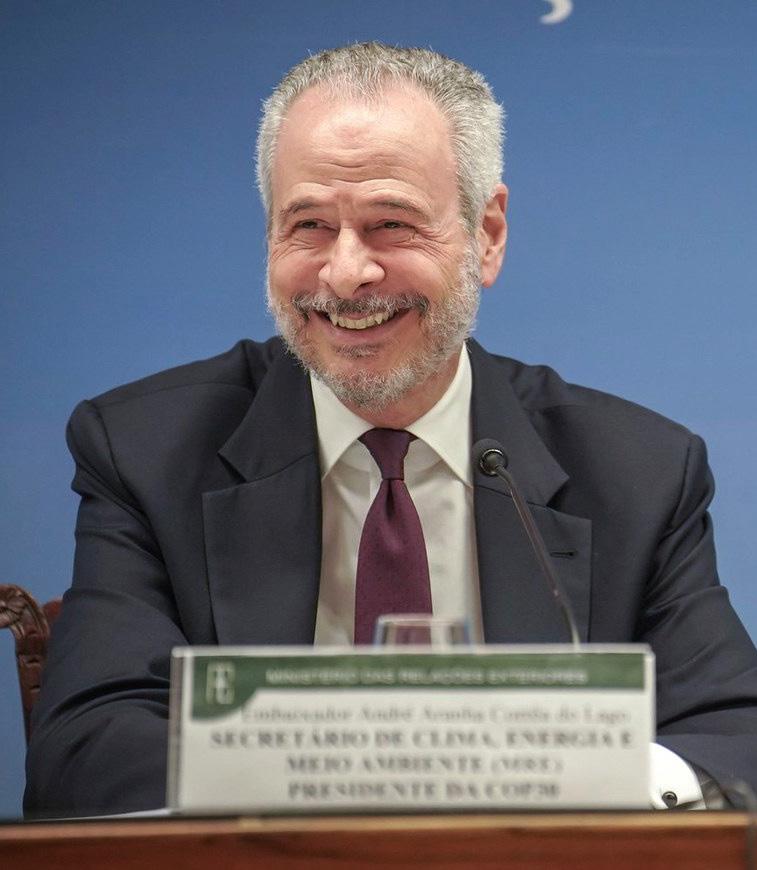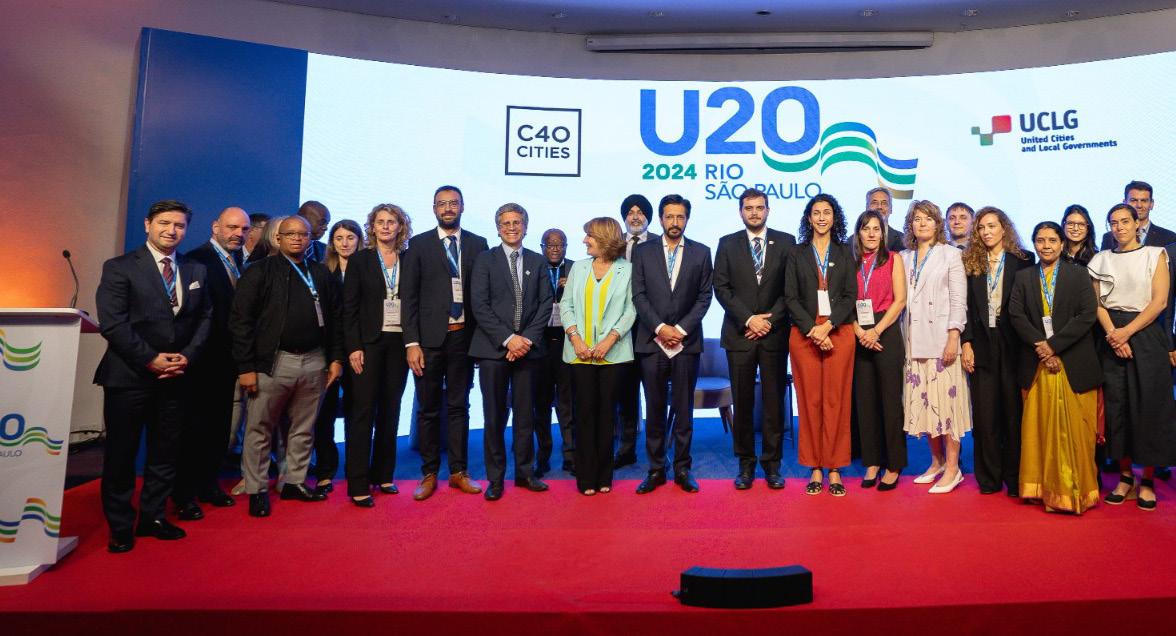
16 minute read
U20 Rio Summit: the voice of cities in 2024
Thalyta Ferraz1, João Carlos Cochlar2
The Urban 20 is the engagement group which consists of a high-level forum for mayoral advocacy within the G20 structure. Since 2017, convened by C40 Cities and UCLG (United Cities and Local Governments), the U20 gathers local authorities from the member states and their invitees to bridge urban perspectives to the G20 agenda. Its goals are based on the premise that cities play a crucial political role in geopolitics since they comprise the closest level of government to the communities they serve3. As stated by Straface and Cammisa, cities “are major actors with popular legitimacy that can influence the quality of life of their residents by playing on the global stage.”4
Cities’ relevance shall intensify.
Today, 56% of the world population live in cities. It will rise to 70% by 2050.5 Understanding the reason for this raise requires acknowledging that urban space is more than territorial configuration. As Brazilian geographer Milton Santos perceives, urban territories bring together activities with the most diverse socioeconomic natures, according to the varied technical, capital and organizational levels of all sorts. This is, in fact, their wealth.6
But these dynamics are a feedback process, which stimulates, often irrationally, urban spaces to grow vertically and horizontally. And the parameters for such growth have been historically setting aside the wellbeing of innumerous communities and the planet’s climate equilibrium. Over 70% of carbon emissions come from cities. They concentrate 60% of the GDP and also 60% of global resources.7 Those percentages are an expressive portion of the unsustainable level of global warming, inequality and scarcity of resources. It is a platitude to say that a completely uncontrolled human intervention in space became a threat to its own existence. And this crisis revealed a tension between a status quo and the need to adapt our space dynamics.8 The space in which we live is where we daily experience rising temperatures, floods, fires and storms. In our surroundings we see rising inequality, from shifts in the labor markets to hunger, housing issues, exodus and several forms of privation, worsened by the climate crisis, became part of our worldview. In the midst of this need for action, local administrations are its frontline to tackle those issues through multi and diverse partnerships and access to funds.
Thus, the U20 became a valuable forum for political propelling on urban issues in the international arena, in a context in which the G20 emerged as the multilateral forum capable of enhancing the changes in financial and major global governance issues. Proceeding to its seventh summit held in Rio de Janeiro, U20 became the cities’ voice to the world, igniting the local perspective on the complex path towards COP30 in Brazil. Beyond an international cities’ forum itself, the 2024 co-chairs cities, Rio de Janeiro and São Paulo, had the responsibility to deliver not only an ambitious Communiqué capable of influencing impactful actions towards citizens, but also a summit which could stage the fulfilment of the highest levels of discussion, project sustainable development and propitious interaction between governmental authorities, academia and private sector.
The next part of this essay aims to tell a bit about the process of seeking this ambition at the U20 Summit in Rio de Janeiro.
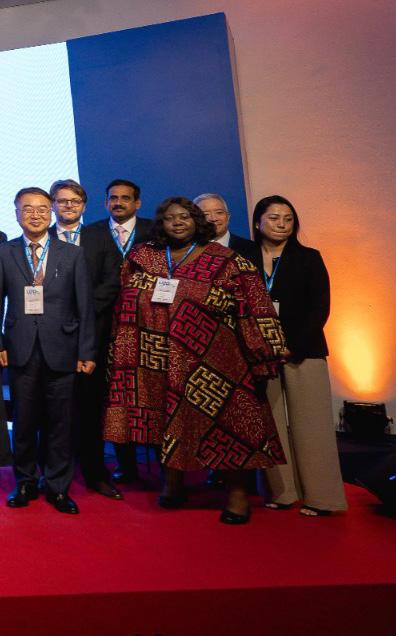
From Rio to the world
The conceptualization process of the U20 2024 cycle, particularly the U20 Rio Summit, was envisioned to mirror the Brazilian G20 presidential guidelines. They are three: (i) combating hunger, poverty and inequalities; (ii) tackling climate change and fostering energy transition through effective sustainable actions; and (iii) addressing the reform of multilateralism. For Rio de Janeiro’s International Relations Department, it was a crucial step to build such an advocacy event anchored in the priorities of the Brazilian Presidency, emphasizing urban sustainable finance, addressing its barriers, challenges and gaps while advocating for a people-centered agenda, combining a complementary approach to the North and South respective issues and claims about adaptation and mitigation climate finance. In this matter, currently, developed countries have secured 44% of climate action financing, whereas emerging markets and developing economies (EMDEs) receive only 14%, and leastdeveloped countries (LDCs) just 2% of global climate funds. Consequently, EMDEs and LDCs are lagging in the shift toward low-carbon, resilient economies while facing escalating climate change impacts.9
The G20’s 2024 edition was surrounded by severe geopolitical challenges. Despite strategies focused on the financial architecture and preventing global economic and health crisis (also a COVID-19 pandemic reflex), it is well acknowledged that international fora such as the G20 and G7 have faced unity issues since the breakout of military campaigns, the conflicts in Ukraine, Palestine, among others. The Brazilian G20 presidency proposal was meant overcome this recent challenges, encompassing urgent global matters, such as hunger, launching two main task forces - the Global Alliance Against Hunger and Global Mobilization Against Climate Change - while addressing the loss of credibility and efficiency of the global governance system itself, under the ongoing multicrises and the tension of two impactful geopolitical conflicts.
Under this background, the U20 2024 cycle was structured under three main gatherings: a virtual Sherpa Meeting, held virtually in March, when the cycle’s agenda and main priorities, Chairs and Conveners approach to them were presented, followed by a hearing session of city members’ contributions; a mid-term Summit hosted by the City of São Paulo in June; and the final U20 Summit and Official Communiqué handover, held on the eve of the G20 Leaders Summit in November, in Rio.
The space in which we live is where we daily experience rising temperatures, floods, fires and storms. In our surroundings we see rising inequality, from shifts in the labor markets to hunger, housing issues, exodus and several forms of privation, worsened by the climate crisis, became part of our worldview. In the midst of this need for action, local administrations are its frontline to tackle those issues through multi and diverse partnerships and access to funds.
To the final summit, Rio de Janeiro promoted, for the first time in U20’s history, a four-day Summit on the eve of the G20 leaders meeting. The first three days the panels gathered and mixed debates and keynotes of Mayors, government and scientific authorities, civil society and private sector representatives. In addition to a center stage, three other stages were dedicated to discussions surrounding topics of climate mitigation/adaptation, social inequality and governance reform. This four-day event blended public sessions with a Mayoral Closed Door Meeting on the last day, fostering meaningful dialogue on innovative solutions for inclusive urban development.
The Communiqué’s development followed the same structure as the cycle’s goals, prioritizing the fight against hunger and inequality as its primary objective. On climate and energy transition, negotiations centered on terminology and target deadlines. The key points and claims on finance issues can be summarized: →
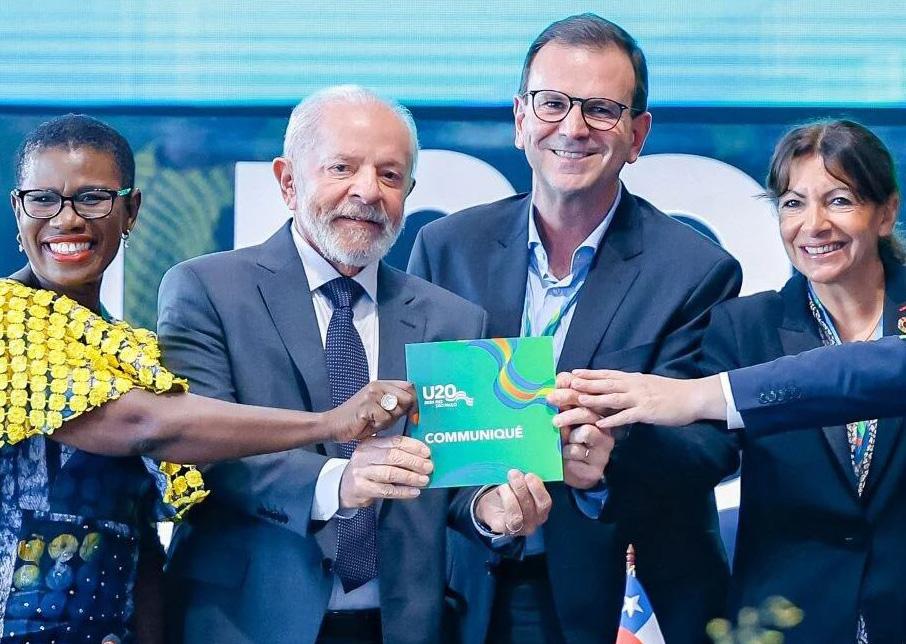
• Recognition of Local Governments: Urging the G20 to formally acknowledge the distinct role of local governments as integral public actors in addressing global challenges.
• Financial Support for Cities: Emphasizing the need for financial backing to help cities contribute effectively to the G20’s three key priorities.
• Support for CHAMP & Climate Action: Endorsing CHAMP as a key initiative for implementing the Paris Agreement and calling for cities to be included in intergovernmental negotiations on climate governance.
• Improved Access to Capital: Demanding a renewed global financial system that grants cities faster, more inclusive access to funding for essential services, sustainability, and resilience.
• Call for $800 Billion in Urban Climate Investment: Recognizing Brazil’s leadership in reforming multilateral banks and requesting G20 governments to commit at least $800 billion annually by 2030 for urban mitigation and adaptation, unlocking private sector investments.
• Guarantee Funds for Cities: Requesting the creation and support for operationalization of financial guarantee mechanisms to help cities secure direct or indirect loans under better conditions from public and private financial institutions.
As its collaborative development and review process evolved among U20 cities, the points of tension expected to be seen in the national levels reflected among local governments positions as well. For that, it is worth mentioning that mid-term in person meetings in São Paulo not only revealed those sensitive points as well as offered an outstanding opportunity for discussing them. Under an outstanding mediation of the U20 conveners chairs, the core issues were heard, elaborated and a majority consensus on the chapeau text was possible to achieve, an exercise itself represents the strength and value of international spaces for negotiation, building trust and common ground.
Exploring the city of Rio’s as a looked for and worth travelling space, the City has initiated its known yet ambitious practice of the IR department of gathering a diverse range of partners— including city networks, global experts, and academic institutions — the U20 Rio Summit was seen as a collaborative platform to reimagine urban governance.
Many relevant consensus were delivered and reiterated in the U20 Communiqué on sensitive topics such as digital future, labor market, social inclusion, infrastructure, health, access to healthy eating, housing and water security. Above all, there was a strong effort to align with the G20’s mandate, maintaining a forward-looking tone on accelerating the cities’ financial access and their role in the multilateral organisations. In the end, a remarkable number of cities signed the document, which was delivered directly to Brazil’s and G20 President, Lula da Silva who, together with the President of Chile, Gabriel Boric, attended the Mayoral Plenary and the official handover of the U20 Communiqué.
Rio’s IR Department had also another concern: the economic and symbolic relevance to the U20 Summit to be held in Rio de Janeiro, as a prominent city to Brazil and to the Global South10. Rio de Janeiro has a natural talent for hosting major events, making it a fitting choice for high-level political meetings, as history shows. As Brazil’s most iconic city, its streets tell the nation’s unique background, and it is home to key cultural and historical landmarks. Strategically located, Rio is a hub for oil and gas, investments, media, and telecommunications, with strong port and airport infrastructure connecting it globally. As noted by Rio’s U20 Sherpa and G20 Committee President, the city’s selection highlights its organizational capacity and urban stability, reinforcing its reputation as a secure and efficient event destination.11
Exploring the city of Rio’s as a looked for and worth travelling space, the City has initiated its known yet ambitious practice of the IR department of gathering a diverse range of partners—including city networks, global experts, and academic institutions — the U20 Rio Summit was seen as a collaborative platform to reimagine urban governance. Through this approach, it aimed to balance economic, environmental, and social imperatives, providing a comprehensive roadmap for cities to advance sustainability, equity, and resilience.
The story we are able to tell about the U20 Rio Summit is of a successful engagement with civil society, benefiting from the innovative Social G20, a platform launched by the Brazilian presidency aiming to strengthen the 13 engagement groups. The U20 Rio Summit featured a record participation of 55 partner institutions, 76 public and closed sessions, and 91 hours of activities. The summit attracted an audience of nearly 5,000 people, with representatives from over 80 cities. This summit also held tens of bilateral meetings with high-level local authorities with private agents and scholars. There has never been a previous edition of the U20 with such large engagement.
The U20 Rio Summit on the eve of the G20 Leaders Summit represented a once in a lifetime opportunity for leaders from all government levels to be in the same city, debate and showcase their urge for impactful partnerships. An opportunity also for local leaders to urge for access funding for cities to tackle their emergent issues and deliver faster, fairer climate action. It sets a reference for the future, and our expectation is of progressive achievements in the international gatherings to come.
The timeline for achieving development goals remains critically delayed, demanding urgent and coordinated action. The presence of President Lula and his eight government ministers at the U20 Rio Summit reflected a growing awareness of the G20 presidency on the vital role of cities in shaping global agendas. At the same time cities are more sensitive to the immediate demands of their citizens, they lack resources as compared to regional or national governments. The demand to reduce and change the negative externalities of the way we have been interacting with the space we live in throughout the last decades requires massive investment.
In acknowledgement of efforts by the Brazilian presidency in advancing the reform of multilateral development banks, Mayor Paes called on the G20 governments to commit an investment to unlocking funding and improving local governments’ access to essential resources. Finally, stated an appeal on behalf of the Global South:
“an agenda for reducing inequalities must not only ensure equity among citizens but also among cities. Today, the stark disparity in access to capital between the Global South and the Global North must be addressed—especially considering the historical processes that have shaped this imbalance. Bridging this gap is imperative for true global progress. The development of cities in less developed and developing nations is the only path to real and lasting equality among nations.”12
As Brazil prepares to host COP30, it does so in the wake of unresolved challenges from COP29, including insufficient climate financing and weak accountability from developed nations. While developing countries called for a $1.3 trillion annual fund13, only $300 billion was proposed, with no clear responsibility for wealthier nations or guarantees of public funding. The reliance on loans risks worsening debt burdens. COP29 also failed to advance emissions reduction goals, prioritizing carbon markets instead.
Against this backdrop, strengthening initiatives like CHAMP is crucial to increasing climate ambition and Brazil’s leadership at COP30 will be crucial. The country has the opportunity—and the responsibility—to restore confidence in international climate negotiations and cooperation, while advocating for more equitable financial mechanisms that do not disproportionately burden the Global South. Cities, once again, can play a pivotal role in shaping solutions. As key actors in climate action, urban centers must be fully integrated into the global climate agenda, ensuring that local governments have the resources and influence necessary to drive meaningful change.
Finally, the lessons taken by the U20 Summit in Rio could be summarized as the following sentence: strengthening and coordinating local authorities towards a pathway of urban sustainable development is the key to climate justice and prosperity. It is a message of local communities to world leaders that multilevel cooperation and governance is possible and effective to face the environmental challenges imposed on humankind in the 21st century.
Action must be through the cities to the world. Urbi et orbi, as would say Pope Francis and his predecessors throughout the centuries. It is pertinent to mention the Pope’s encyclical Laudato Si, one of the most visionary papal manifestations in history. It deals with the idea of a social ecology, as former Irish President Mary Robinson tackles the idea of climate justice.
As Pope Francis states:
“Social ecology is necessarily institutional, and gradually extends to the whole of society, from the primary social group, the family, to the wider local, national and international communities. Within each social stratum, and between them, institutions develop to regulate human relationships. Anything which weakens those institutions has negative consequences, such as injustice, violence and loss of freedom.”
A lack of multilevel partnership and obstructing the full potential of local governments to promote urban sustainable development is, at last consequence, an action that strengthens injustice, violence and loss of freedom. The legacy of Rio and São Paulo’s edition of the U20 is to strengthen the forum’s capacities to its full potential, so it may create concrete action towards livable and prosperous cities, irradiating further achievements for future editions to come. ■
1. Internationalist, holds a MA in International Relations from Pontifical Catholic University of Rio de Janeiro. Local Diplomacy Advisor at Rio de Janeiro City Hall, Focal Point for U20 2024 Cycle until December, 2024.
2. International Relations Advisor at Rio de Janeiro City Hall. LL.M. Candidate at the Pontifical Catholic University of Rio de Janeiro.
3. 2024 U20 Communiqué.
4. STRAFACE, Fernando; CAMMISA, Mariana. Urban 20: Six Editions of City Diplomacy at the Highest Level. In: VORMITTAG, Pedro; ALBUQUERQUE, Marianna; BIRCH, Eugénie (org.). Urban Sustainable Development: governance, finance and politics. Rio de Janeiro: CEBRI, 2024, p. 103
5. Idem.
6. SANTOS, Milton. A natureza do espaço, Técnica e Tempo, Razão e Emoção / [The nature of space: Technique and Time, Reason and Emotion], São Paulo: Ed. USP, 2006, p. 209.
7. CRIPPA, Monica et. al. Global anthropogenic emissions in urban areas: patterns, trends, and challenges, Environ. Res. Lett. 16 (2021) 074033.
8. COCHLAR, João Carlos. For a city network jurisdiction. In: VORMITTAG, Pedro et. al.. Op. cit., p. 126-131.
9. Accelerating Sustainable Finance for Emerging Markets and Developing Economies: Independent Review of the Vertical Climate and Environmental Funds. G20 Independent High-Level Expert Group (G20 IHLEG, 2024). The report is vailable on the website of the G20 at www.g20.org/en/ and on the website of the G20 SFWG at www.g20sfwg.org.
10. MARIANO, Antônio; PADILHA, Lucas. Rio Capital do G20: Desafios da cidade-sede [Rio Capital of G20: Challenges of the host city]. In: Cadernos Adenauer, Edição Especial 2: G20 no Brasil, Ano XXV, 2024, p. 143.
11. Idem, p. 146.
12. U20 Rio Summit’s Mayoral Plenary on Feb. 17th, 2024. Ceremony at the Official Handover of the Communiqué. Speech delivered by Mayor Eduardo Paes, of Rio de Janeiro.
13. Accelerating Sustainable Finance for Emerging Markets and Developing Economies. Op. cit., 2024
14. Pope Francis. (2015). Laudato Si’ [On Care for Our Common Home] [Encyclical letter], item 142.
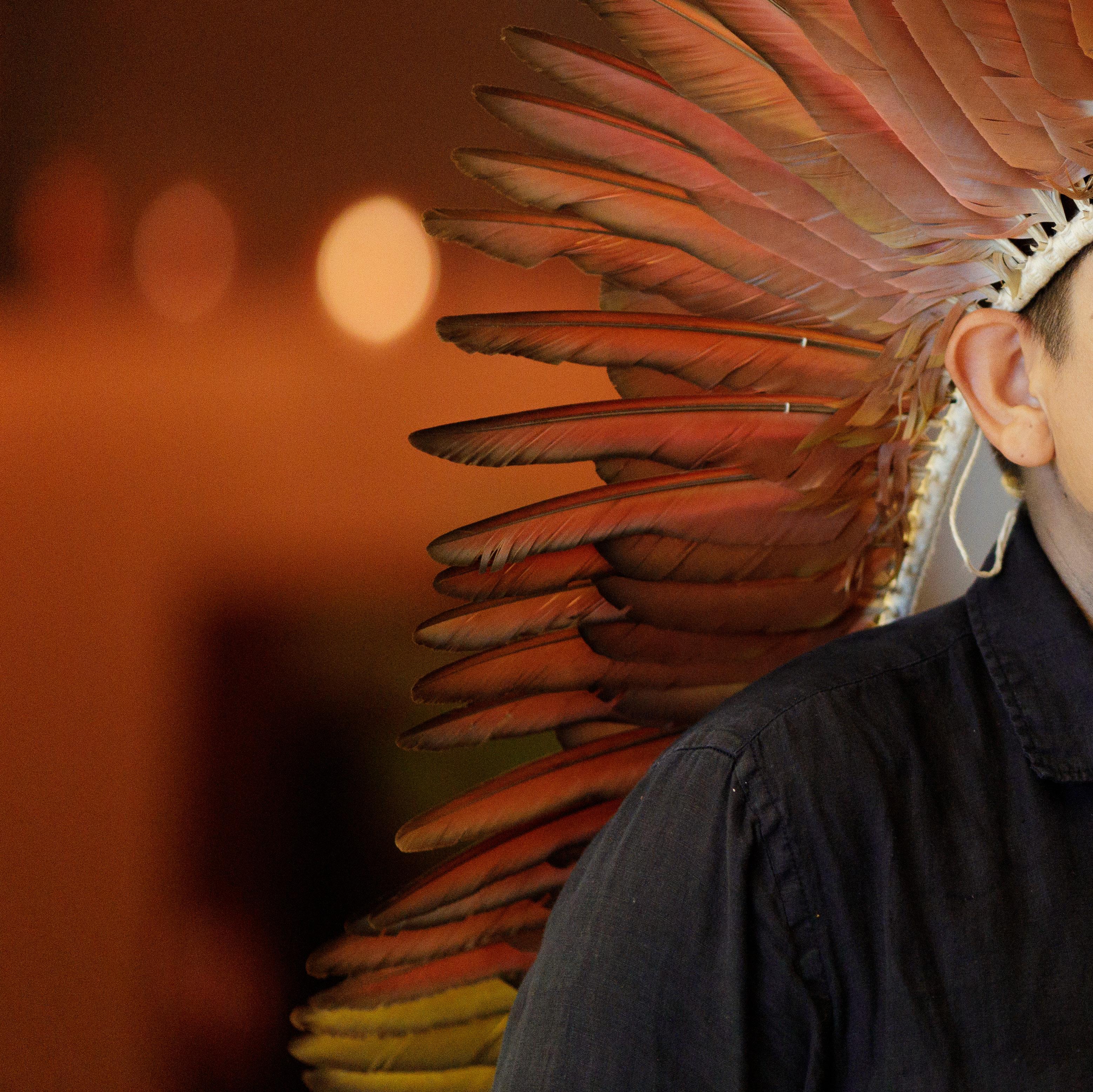
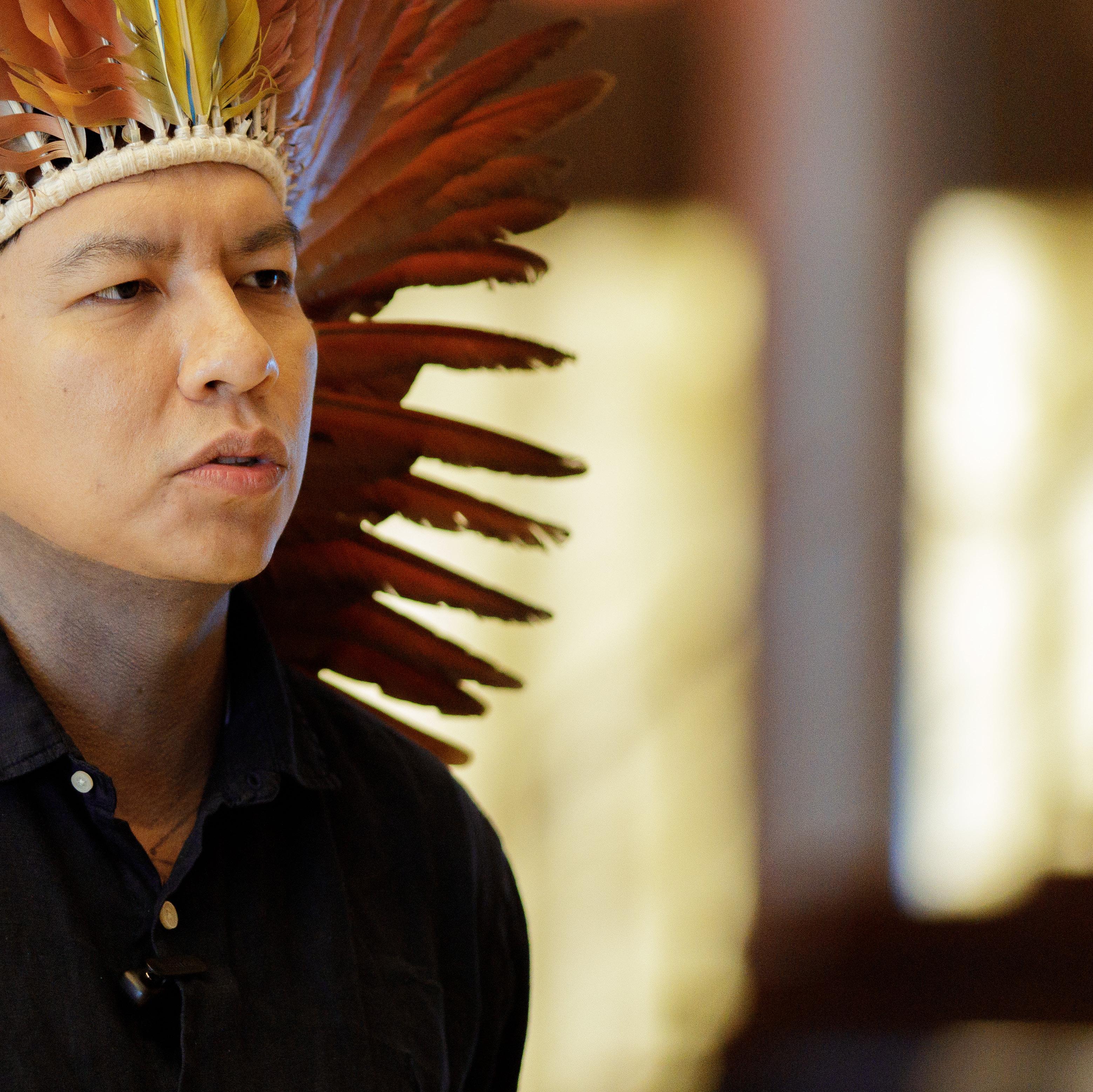
Dear friends,
I greet the Secretary-General of the United Nations, António Guterres, and all my fellow heads of state and government who accepted our invitation to this Summit.
Our meeting takes place at a particularly sad time, due to the death of Pope Francisco.
I am sure that his teachings on the need for an ‘integral ecology’, which sees nature and humanity as a whole, will serve as an inspiration for us.
With less than seven months until COP30, which Brazil will host in Belém do Pará, the planet seems to be entering uncharted territory for science.
Global warming is taking place at a faster rate than predicted.
In 2024, the Earth’s average temperature surpassed for the first time the critical threshold of one and a half degrees above pre-industrial levels.
Many ecosystems, such as forests, glaciers, and seas, are at risk of reaching a point of no return.
The Amazon has recorded the worst drought in its history and the extreme heat has caused massive coral bleaching in the ocean.
Denying the climate crisis will not make it disappear.
We must ensure that multilateralism and international cooperation remain the cornerstone of the global response to climate change.
Despite the attacks on the Paris Agreement, it is thanks to it that we have reversed the most pessimistic projections of temperature rise, which predicted an increase of four degrees by the end of the century.
In Brazil, when we want to mobilize efforts toward a common goal, we use an indigenous word called “mutirão.”
We want to make COP30 a great “mutirão” in favor of the implementation of climate commitments.
Wars, arms races, and interruptions in development aid and climate financing are pushing us backward.
The planet is already tired of unfulfilled
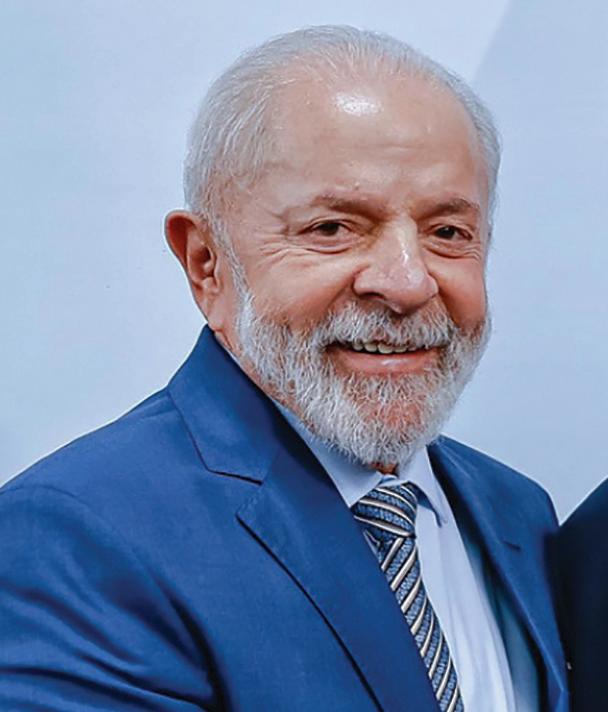
Message
President
Luiz Inácio Lula da Silva speech at the Virtual Climate Ambition Summit
promises. This year, all countries must present their new Nationally Determined Contributions (NDCs), with carbon emissions reduction targets by 2035.
Brazil presented its NDC at the Baku COP. We aim for a reduction of 59 to 67% in emissions, covering all greenhouse gases and all sectors of the economy.
Internally, we are developing a Climate Plan that will include strategies for mitigation, adaptation, and climate justice.
We cannot talk about a just transition without incorporating the perspectives of historically marginalized groups—such as women, Black people, and Indigenous peoples—and without taking into account the specific circumstances of the Global South.
The architecture for preparing the NDCs is flexible enough to combine ambitious goals with the development needs of each state.
Wealthy countries – which have been the biggest beneficiaries of a carbon-based economy – must live up to their responsibilities.
It is in their hands to bring forward climate neutrality targets and increase financing to the goal of one trillion and three hundred billion dollars.
I make a special call for support to four initiatives that should pave our way to Belém in the coming months.
The first of these is an effort we call the Global Ethical Balance. Brazil and the UN will bring together youth and religious leaders, artists, indigenous peoples, scientists, and decision-makers around a new pact with the planet.
The second is the Global Alliance against Hunger and Poverty. Together with FAO, we have developed a guide for the inclusion of social policies and food systems transformation in the NDCs.
In 2024, the Earth’s average temperature surpassed for the first time the critical threshold of one and a half degrees above pre-industrial levels. Many ecosystems, such as forests, glaciers, and seas, are at risk of reaching a point of no return.
The third is the Global Initiative for the Integrity of Climate Change Information, in partnership with United Nations Educational, Scientific and Cultural Organization (UNESCO), which aims to value science and combat disinformation.
Finally, we have the Tropical Forests Forever Fund, to be launched at COP30, which will reward developing countries that preserve their forests.
This summit represents the beginning of a broad movement towards COP 30.
In the year we celebrate the 80th anniversary of the United Nations, I invite everyone to an open, frank, and genuine dialogue about what needs to be done to advance the fight against climate change. Thank you very much. ■
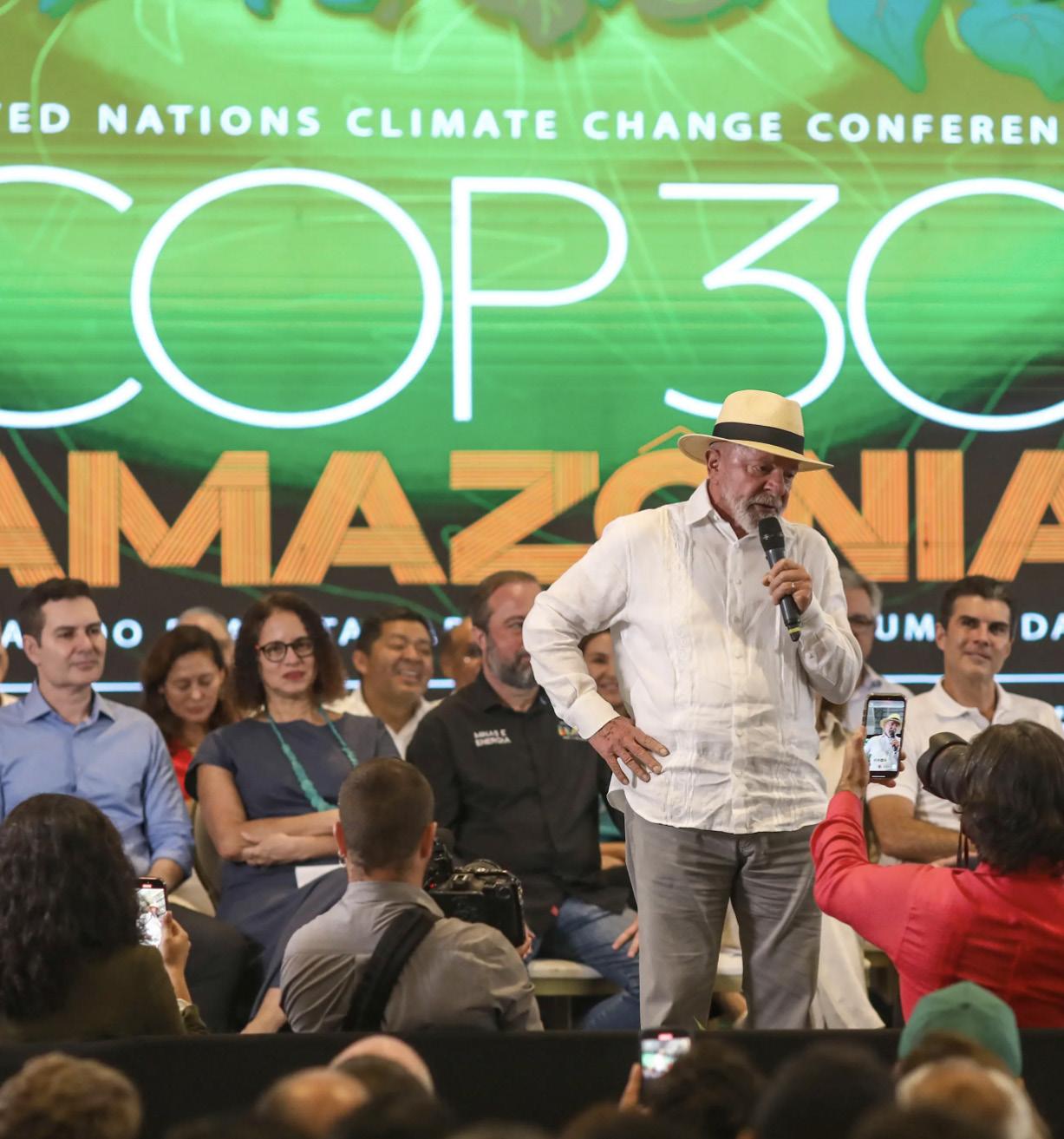
Dear friends,
This is my first formal address as incoming COP30 President. The choice of the General Assembly as my first official trip outside of Brazil is not a coincidence, but a clear sign that the defense of multilateralism will be at the very core of the Brazilian presidency of the COP.
Respect for science will be another pillar of our presidency. In 1988, we, the United Nations, identified climate change as a “common concern for humankind” and created the Intergovernmental Panel on Climate Change, the IPCC. Our leaders listened to scientific alerts and came together four years later in around the ultimate objective of preventing dangerous anthropogenic interference with the climate system. At the 1992 United Nations Conference on Environment and Development, the Rio ‘Earth Summit,’ world leaders signed the United Nations Framework Convention on Climate Change, the UNFCCC, defining principles and the five building-blocks for the multilateral response to climate change: mitigation, adaptation, finance, technology, and capacity-building.
Similarly to the UNFCCC’s role in inaugurating multilateral climate governance, Brazil’s Federal Constitution binds the country to be governed in its international relations by principles that include “cooperation among peoples for the progress of humanity.” This fundamental principle will guide the incoming presidency of COP30, not only because our diplomacy is constitutionally bound by it, but because Brazil has the firm conviction that there is no future progress for humanity without deep, rapid, and sustained cooperation among all countries.
Brazil will host and preside over COP30 in November 2025 against the backdrop of several landmarks: the 80th anniversary of the United Nations, 20 years since the entry into force of the Kyoto Protocol and 10 years of adoption of the Paris Agreement. Much has been learned throughout the three decades of our multilateral regime. Through achievements and shortcomings, the UNFCCC has provided a mirror of humanity’s greatest qualities and limitations. It has shown us how our societies, economies, and politics should work –and how they do in practice.
We now enter 2025 with another
